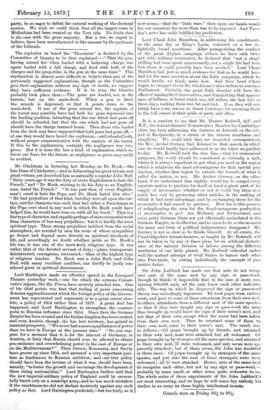Lord Hartington made an effective speech in the Liverpool 'Theatre
yesterday week,—one for which the extreme Conser- vative organs, like the Times, have severely attacked him. One of his chief points was that that feeling of panic concerning Russian aggrandisement which the foreign policy of the Govern- ment has represented and expressed, is to a great extent obso- lete, a policy of 1854 rather than of 1879. A great deal has happened, said Lord Hartington, to strengthen the counter- poise to Russian influence since 1854. Since then the German Empire has been created and the Italian kingdom has been created, and even Austria, though she has lost territory, has gained in materialprosperity. " We never had a more equal balance of power than we have in Europe at the present time." " Do you sup- pose for a moment that it is for the interest of Germany, or Austria, or Italy that Russia should ever be allowed to obtain pre-eminence and overwhelming power in the east of Europe or on the Mediterranean?" Then Greece, Roumania, and Servia have grown up since 1854, and assumed a very important posi- tion as hindrances to Russian ambition ; and our true policy should have been the reverse of what it was, should have been, namely, "to foster the growth and encourage the development of these rising nationalities." Lord Hartington further said that the new imperial-military policy of England could be success- fully based only on a conscript army, and he was much mistaken if the constituencies did not declare decisively against any such- policy as that. Lord Hartington predicted,—but too truly, as it
now seems,—that the "little wars" then upon our hands would tax our resources far more than was to be expected. And Tues- day's news has sadly fulfilled his prediction.


































 Previous page
Previous page